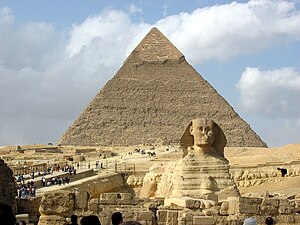Sibilisasyon

Ang sibilisasyon isa sa komplikadong katilingban nga makit-an ning maong mga karakteristik: pag-ugmad nga urban, usa ka sistema sa pagbahig sa mga tao sa katilingban (social stratification), simbolikanhong komunikasyon sama sa pagsulat, ug pag-ila nga sila may kontrol sa kalikopan palibot nila.[1][2][3][4][5][6][7][8]
tagalog[usba | usba ang wikitext]
Mga reperensiya[usba | usba ang wikitext]
- ↑ Adams, Robert McCormick (1966). The Evolution of Urban Society. Transaction Publishers. p. 13.
- ↑ Cultural Anthropology: The Human Challenge. Cengage Learning. 2013. p. 250.
{{cite book}}: Cite uses deprecated parameter|authors=(help) - ↑ Wright, Ronald (2004). A Short History of Progress. House of Anansi. pp. 115, 117, and 212.
- ↑ "Civilization".
- ↑ Llobera, Josep (2003). An Invitation to Anthropology. Berghahn Books. pp. 136–137.
- ↑ Fernández-Armesto, Felipe (2001). Civilizations: Culture, Ambition, and the Transformation of Nature. Simon & Schuster.
- ↑ Boyden, Stephen Vickers (2004). The Biology of Civilisation. UNSW Press. pp. 7–8.
- ↑ Solms-Laubach, Franz (2007). Nietzsche and Early German and Austrian Sociology. Walter de Gruyter. pp. 115, 117, and 212.
